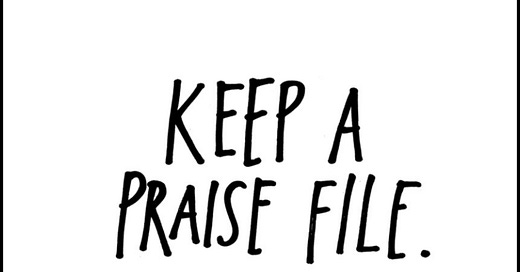Words of affirmation may mean more to us later so why not store them away?
This summer while I was working on CharityStack at Antler, one of the founders in our batch recommended a book called Steal Like An Artist. He even lended me his copy and almost didn’t take it back when I tried to return it, which was a really thoughtful gesture on his end as this book obviously benefitted me. It was a fun read and one of the best things I took from it was the below page related to a praise file:
Ever since then, I’ve kept a “Delayed Praise” file on my phone of kind things people have said to me or even wholesome digital moments I appreciated in general. I haven’t actually scrolled through it properly in the months since I created the folder but just knowing it exists can serve as a source of comfort in and of itself. It’s also a reminder that I’ve been blessed to have the company of people who are generous with their words or actions so I don’t lose sight of that over time.
This weekend I was able to drop by a conference and listen to a few scholars talk about Prophetic Conduct and a reminder there really stood out to me somewhat related to this concept. One speaker mentioned that the Prophet (S) always remembered people and he never forgot their efforts. He was truly loyal in this sense. Nowadays, we’re lucky to remember someone’s name the second time we meet them. A kind word is not something I imagine he would’ve forgotten, so in the spirit of that I, too, hope to remember what people have said or done to make a positive impact on me by maintaining this file or folder with some level of consistency to offset any deficiency in my memory.
I was speaking to a friend earlier in the summer who was about to take on a challenging commitment. Somewhere along the conversation, we chatted about how he had a difficult time taking praise so I had shared this concept of “parking” validation with him then. We both randomly hopped on a call today and he mentioned that conversation we had, which prompted me to finish this newsletter months later. There are no coincidences.
I leave you with a clip from Ustadh Ubaydullah Evans on learning how to accept a gift.
“The world is not in need of your performative, excessive self-deprecation.”
See you next post.





